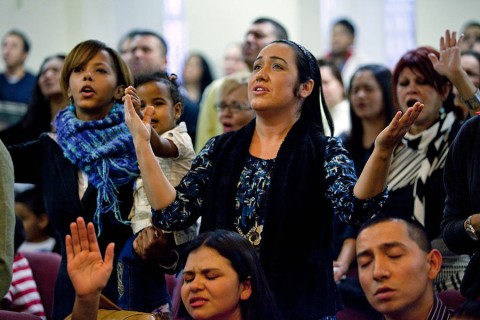Amid evangelical decline, split grows between young adults and church elders
Only 11 percent of evangelicals are younger than 30, according to a recent study.

(The Christian Science Monitor) For Andrew Walker, the current state of American culture poses a serious challenge to the faithful.
For a variety of reasons, fewer and fewer Americans now have a grasp of the fundamentals of orthodox biblical teachings, said Walker, director of policy studies for the Ethics and Religious Liberty Commission of the Southern Baptist Convention.
“Once Christianity is loosed from its doctrinal contours, you make it much less persuasive,” he said. “You will always have more robust sincerity for your faith where you have churches that are more bound by biblical teachings and the confessions of the church.”
Read our latest issue or browse back issues.
The Southern Baptist Convention, one of the more conservative evangelical Protestant denominations, has lost more than a million members over the past decade. Though still the largest single Protestant group in the nation with more than 15 million members, its total number of baptisms is the fewest in 70 years, the denomination’s research shows.
For years, it has been more or less conventional thinking, especially among evangelicals, that “churches that stay with a clear-cut theological orientation will not go the way of the mainlines,” noted Bill Leonard, professor of Baptist studies at Wake Forest University, citing the 1972 study Why Conservative Churches Are Growing by the sociologist Dean Kelley. “Liberal mainline churches were then castigated for giving up the true faith and deserving what they got.”
Today, however, there are signs that many of the same trends found in mainline Protestantism over the past few decades are now showing up among evangelical denominations as well. According to a massive study by the Public Religion Research Institute released in September, the number of evangelical Protestants who are white fell from about 23 percent of the U.S. population in 2006 to 17 percent in 2016.
Among many evangelicals there is now a sense of urgency both to reassert the fundamentals of Christian orthodoxy—the key to vibrancy and growth, many believe—and to ratchet up their political efforts to bolster religious liberty in the public square.
In early October, the Trump administration expanded the rights of employers to claim religious exemptions to the federal mandate to include contraception coverage in employer-provided health plans. And for the past few years, conservative evangelicals have been working to carve out religious liberty exemptions for businesses—for example, wedding vendors who object to providing services for same-sex wedding ceremonies.
Yet precisely because of such efforts, younger conservative Christians like Chelsie Maynard have been conflicted about their religious identity. A pastor’s kid from upstate New York, her father is a politically engaged conservative evangelical minister. Her older brother, now in his late twenties, is a pastor too. Maynard, a social worker at a children’s health clinic in Boston, has decided to prepare for ordination in the Church of the Nazarene.
“I firmly believe that Christ is the way, the truth, and the life, and that he put his church on Earth as a means to bringing other people into the family,” Maynard said. “But if someone were to ask me if I’m an evangelical, I don’t know how I would respond to that.”
At least part of the reason for the decline among American evangelicals is the fact that more young people have already stopped embracing the identity. Today, only 11 percent of evangelicals are younger than 30, according to PRRI.
Maynard has come to reject the deep political associations that evangelicals have forged with the Republican Party, and she feels alienated by the party’s general distrust of Islam and efforts to curtail immigration.
It’s more than politics. Unlike previous generations, Maynard has lived her faith in an American culture that has become more and more diverse, and she has developed close relationships with people different from her.
“For me, a lot of this has especially come into play with the treatment of the LGBTQ community,” she said. “I want the church to be a place of conversation and shared journey. I’m not ready to throw it out yet. But I do want to see it grow and change.”
In September a group of more than 150 evangelical leaders, most of them Southern Baptists, issued the Nashville Statement, a series of 14 affirmations and denials that articulate a traditional sexual ethic and view of gender. Critics noted that the statement went beyond condemning same-sex relationships and transgender identity: it also condemns those who affirm them.
“There are all these other issues going on in our world, issues of justice and reconciliation, which are at the heart of Christianity, and here is a statement that isn’t about reconciliation at all,” said Corey MacPherson, chaplain at Colgate University and an evangelical member of the National Association of College and University Chaplains. “Younger evangelicals especially, they just don’t want to be a part of that—that’s not what they want to be associated with.”
Young people moving away from evangelical churches has long been a concern for Chelsen Vicari, the evangelical action director at the Institute on Religion and Democracy in Washington, who signed the Nashville Statement.
“I would argue that it’s due, really, to a lack of theological training, or catechism,” Vicari said. “I mean, catechism isn’t even a word that most evangelicals know or understand. So I’ve been encouraging faithful evangelicals to focus on better equipping, better educating younger evangelicals in the faith.”
A version of this article appears in the November 8 print edition under the title “Amid evangelical decline, split grows between young adults and church elders.”





